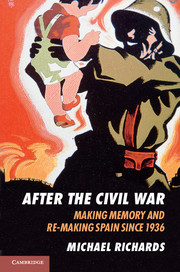Book contents
- Frontmatter
- Contents
- List of maps and tables
- Preface
- Acknowledgements
- Maps
- Introduction: cultural trauma in Spain
- Part I Setting the scene
- Part II Memories of war during the Franco years
- Part III Memories of war after Franco
- 10 Transition and consent: the presence of the past, 1975–1980
- 11 ‘The level of our times’: memory and modernisation, 1981–1996
- 12 Collective identity and the ethics of memory, 1996–2007
- Conclusion: the history of war memories in Spain
- Glossary and abbreviations
- Sources and select bibliography
- Index
- References
12 - Collective identity and the ethics of memory, 1996–2007
Published online by Cambridge University Press: 05 June 2013
- Frontmatter
- Contents
- List of maps and tables
- Preface
- Acknowledgements
- Maps
- Introduction: cultural trauma in Spain
- Part I Setting the scene
- Part II Memories of war during the Franco years
- Part III Memories of war after Franco
- 10 Transition and consent: the presence of the past, 1975–1980
- 11 ‘The level of our times’: memory and modernisation, 1981–1996
- 12 Collective identity and the ethics of memory, 1996–2007
- Conclusion: the history of war memories in Spain
- Glossary and abbreviations
- Sources and select bibliography
- Index
- References
Summary
This is not about exhuming bodies, or generating hatred or animating vengeance, but reaffirming the values of freedom, the superiority of democracy, the magnificence of pluralism, the importance of a balanced, functioning, state of law.
Unearthing the past
In late October 2000 a team of forensic archaeologists began excavating an anonymous ditch in the town of Priaranza del Bierzo in León, northern Spain, thought to be the site of the disposal of the body of Emilio Silva Faba, a member of Manuel Azaña's moderate liberal Izquierda Republicana party of the 1930s, who, with twelve others, had been shot by anti-Republican rebels on 16 October 1936, at the age of 44, leaving a wife and six children. Silva Faba's grandson, also called Emilio, had been researching the history of his grandfather and the location of his remains for some time. The case was by no means unique. It has been estimated that the bodies of some 30,000 unidentified men and women, killed by armed groups supporting the rebels of 1936, remained to be recovered from similar burial pits at the end of the 1990s. For Silva, born in 1965, and many other Spaniards of his generation – the ‘grandchildren of the war’ – it was morally wrong that victims of political violence who in the 1930s had ‘dreamed of and worked for public freedoms and universal social rights’ should remain buried in unmarked pits and forgotten as the twenty-fifth anniversary of Franco's death and burial in the Pharaonic tomb at the Valle de los Caídos was commemorated. This application of a universalist conception of rights and justice, both retrospectively (to the original violent act) and currently (to the subsequent failure to remember), was manifested within a globalised environment which was different to that of the ethos of the government-sponsored modernity of the 1970s and 1980s and would play a significant role in the politics and culture of memory in Spain from the late 1990s onwards.
- Type
- Chapter
- Information
- After the Civil WarMaking Memory and Re-Making Spain since 1936, pp. 330 - 358Publisher: Cambridge University PressPrint publication year: 2013

